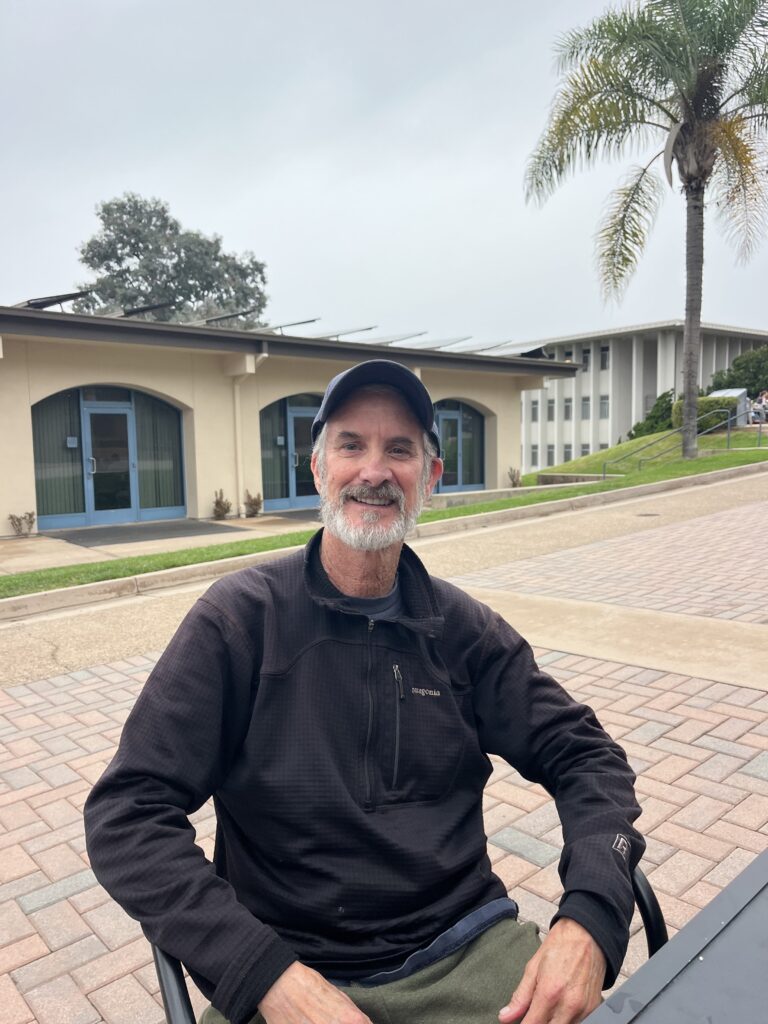Editor’s Note: “Stories from strangers” is a bi-weekly column that features people regularly seen on campus who aren’t affiliated with Point Loma Nazarene University. This series seeks to share their stories, understand what draws them to PLNU and serve as a reminder that every stranger has a story worth hearing.
While students and faculty might assume James Crakes is just a local who’s regularly seen taking strolls through campus, he has more ties to Point Loma Nazarene University than one might expect.
He grew up in the neighborhoods behind Sunset Cliffs and attended elementary, middle and high school in Point Loma. He grew up close to campus because his father, also named James Crakes, was the track and cross country coach at PLNU for more than 20 years.
His father initiated fundraising for the PLNU track to be built in 1983 in preparation for the 1984 Summer Olympics, which were being held in Los Angeles. Crakes’ funds helped transform what was a dirt lot into a field that was to be used by the British team coming to California for the Olympics. His father became a legend and was commemorated by a plaque that still stands beneath the flagpole by the baseball field today.
Following in his father’s footsteps, Crakes also led a successful career in adapted P.E. (physical education) after moving away from San Diego and graduating from Cal Poly, San Luis Obispo (SLO) in 1982.

The Point: What did you study in college, and why did you choose that career?
James Crakes: I ended up being a P.E. major at SLO. Studying P.E. was OK, but I grew up with a sister who had a developmental disability, and because I had some experience with that, I thought I could go into special education P.E. It’s called adapted P.E., and I taught it for 35 years. Then later, since my dad taught [at PLNU], I came to get my master’s in counseling.
TP: When and why did you decide to move back to San Diego?
JC: I moved back to San Diego around 1985 after graduating from SLO. One day, I was visiting my parents, and there was this little house for sale just parallel to Hill Street. People probably passed it up because it was really old and the tenants didn’t want to move, but we were fortunate. We moved in and have been here for the last 25 years. If it weren’t for that house, we wouldn’t be living here, but luckily, it just worked out.
TP: Looking back, how would you describe yourself in college?
JC: I was a goofball. When I was in college, I was always playing in bands, and so I wasn’t thinking about school that much, to be honest. It was because it was my first time away, and I lived in the dorms. I would definitely say live in the dorms your first year because that is where you meet most of your friends. I have probably 10 to 15 friends that I still talk to that I made my freshman year.
TP: In your experience, do you think students have to have it “all figured out” in college?
JC: Everyone’s different, I would say. There’s people at 18 that know exactly what they want to be, like a doctor, for example, and they’re focused for sure. But I would say the majority of kids are just trying to figure it out. I wouldn’t put any pressure on it because you’re going to do the job you’re supposed to do. To me, the most important thing about the college experience was to meet different people and learn that we can’t expect people to think just like us.
